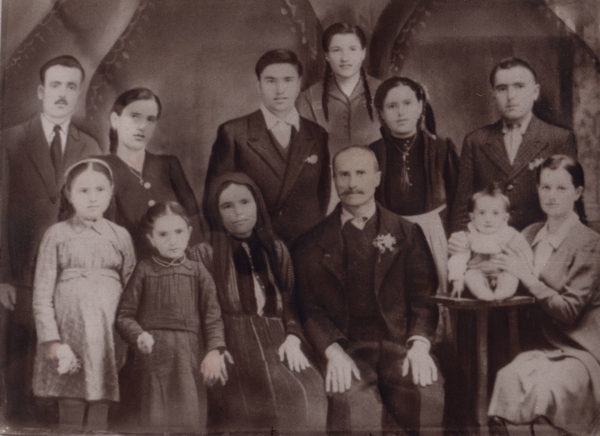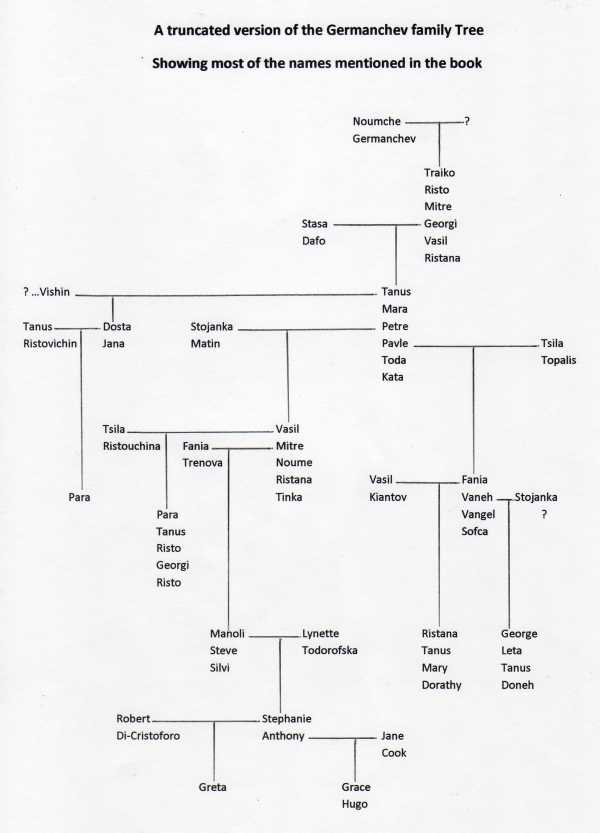
|
|
||||
|
|
||||
|
|
||||
|
|
My Three Birthdays I was born on the 7th of December 1947 during a cold winter day
(according to my grandfather) in a remote village nestled in the rugged
region of south west Macedonia. (This region had been annexed to Greece
and is now part of north west Greece). At that time the region was
in the middle of a civil war. My father was Mitre Germanchev, my mother was Fania Trenova, my grandfather
was Petre Germanchev and my grandmother was Stojanka Matina. On my
mother's side, my grandfather was Stefo Trenov and grandmother was
Mara. That is how we introduced/ identified ourselves. People in the
village want to know your immediate family, in other words they want
to know to which family you belong. The family name was very important
in the village. People are respected by the family's moral standards
and work ethics. The family reputation is paramount for south-eastern
Europeans. Other family members included my grandfather's younger brother Pavle and his family who lived in the other half of the duplex house. If I were to include all the uncles, aunties and cousins who lived there at various times they all would add up to a substantial and interesting lot of characters. Due to the Civil War most adults were dispersed in different places, including war zones, jails and detention camps. Young men, but old enough to fight for the partizani (partisans) would run and hide after being tipped off that the partizani were looking for recruits.
During my birth, which was at home mind you, only the two sets of
grandparents were home and two young aunties to help Mum deliver her
first born in a house without running water, no electricity and no
medical support. It wasn't a good start for a newborn to survive under
such difficult conditions. My father wasn't present at the birth due
to the Civil War which was raging at the time in the nearby hills.
The Civil War promised independence and freedom for the historically
tormented Macedonians but failed to deliver. I won't go into the political
history of the nations in that area as it's very complex and in addition
to that most of the recorded events are inaccurate due to biased recording
of the facts by the victors, suffice to say that Dad (along with his
brothers, cousins and many villagers) was involved in that unnecessary
Civil War against his will. His forced participation in the Civil
War against the Greek National Army had dire consequences for us the
Germanchevi in terms of his future prospects in that country that
recently occupied our land and that didn't acknowledge us as a separate
ethnic group. A risky birth under primitive conditions during a heavy
snow-fall brought Manoli Germanchev to the world on 7th of December
1947 in a village that we call "Mala" but was re named "Tropeouhos"
by the Greek government. In Dad's absence and due to the heavy snowfall
my grandfather decided to report my birth at the village police station
the following day. At the police station, grandad had difficulty making
himself understood because of his poor command of the Greek language.
So, as a result of that miscommunication, my date of birth was recorded
as the 8th of December 1947 (the day that Dedo showed up at the police
station). This date was to be my official birthday for the next 16
years. By the age of 16, I was in Australia and I found myself attending
Richmond Technical School in Richmond, Victoria and attaining very
good results, in fact I was top of the class each year and because
of that, one of my teachers suggested that I should apply for a scholarship
to finance my tertiary studies. In order to qualify for the scholarship
I had to become a naturalized British subject. This required me to
produce my birth certificate which of course was in Tropeouhos, Greece.
I wrote to the government office in Tropeouhos requesting a copy of
my birth certificate. Several weeks later I received a crude copy
that had a scratch mark in front of the number 8 that looked like
the number 1. As a result of this copy, my date of birth read as:
The 18-December-1947. As a result of my naturalization for the purpose
of applying for a scholarship I became a British subject at the age
of 16; by the way I was awarded a scholarship which funded my tertiary
studies for a period of four years. This is how I ended up with three birth days: I was christened by our family Noumko (Godfather), Lazo Gazolainov,
who lived in the village of Neret. (By the way, newly born children
are named by the Noumko, not by the parents.) He named me: Emmanouil
(Manoli as the common name), a religious name relating to Christianity.
It was customary to be given a religiously related name if one was
born close to an important religious date. My brother for instance
who was born close to Easter was named Anastasios (Stase in Macedonian),
meaning resurrection. If a child wasn't born close to Christmas, Easter
or a saint's name day it would be named Risto (Chris) after Jesus
if it was a boy or if it was a girl she would be named Mara after
the Virgin Mary or Ristana (the feminine name for Risto) after Jesus.
That is why a lot of Macedonian families have children named Risto,
Mara and Ristana. Our family name of Germanchev had been changed earlier, sometime
in 1930 to Germantsis (a Greek version of Germanchev). The Greek government
began to systematically change all Macedonian names including villages
and geographic features in a mass ethnic cleansing operation. The
name changing started during the 1920s and continued until 1996. Further
to the agony of the Macedonian people, the use of the Macedonian language
was banned in public places from 1924 onwards. Fines were imposed
on anybody caught speaking Macedonian in public. A story that my Dedo used to like telling people goes something like
this: "I was overheard by a policeman ordering my donkey to stop,
calling out to it "zastani" which means stop in Macedonian.
The policeman heard me and reprimanded me. He stated: "That barbaric
language is banned; you must speak Greek from now on." "But
officer, the donkey does not understand Greek," I replied."
Although the Macedonian language was officially banned in public
places, we spoke Macedonian at home. Unfortunately no one in our family
could read or write in Macedonian; in fact nobody knew the alphabet
so we only knew the spoken Macedonian language. Our ethnic background
and our family's involvement with the partisans during the Greek Civil
War and our insistence for our human rights and refusal to convert
to the Greek ethnicity consigned us to a life of subsistence farming
without any prospects of work in the Greek public service or for any
future government assistance. However for a healthy young boy with a loving family around him and living in a clean natural environment, life was good; I didn't know that anything better or different existed. I simply enjoyed everything around me.
|
 Photo
of Dedo Petre's immediate family. Back row from left: Vasil and his
wife Tsila; Noume and his wife Lefa; Ristana; Dad. Front row from
left: Tinka, Para, Baba, Dedo, baby Manoli and Mum.
Photo
of Dedo Petre's immediate family. Back row from left: Vasil and his
wife Tsila; Noume and his wife Lefa; Ristana; Dad. Front row from
left: Tinka, Para, Baba, Dedo, baby Manoli and Mum.




